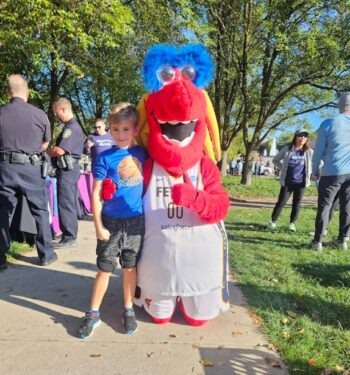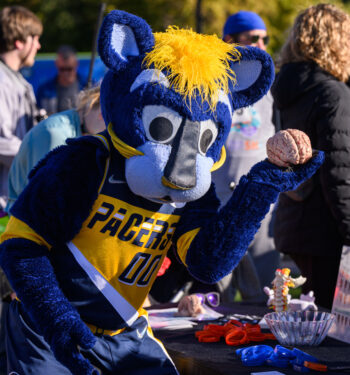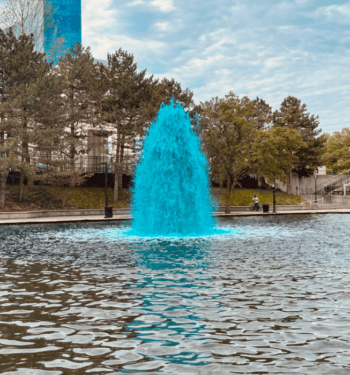April 6, 2017
In his address titled, “Novel Concepts in Spinal Cord Pathophysiology,” Nicholas Theodore, MD, shared ongoing research that may dramatically impact the future treatment of patients with spinal cord injury.
Dr. Theodore gave the 15th Annual Jack and Sabina Frew Lectureship on March 22 at Goodman Hall’s Auditorium and focused on three concepts he is exploring to treat spinal cord injury and dysfunction of the spinal cord. Theodore is the director of the Johns Hopkins Neurosurgical Spine Center in Baltimore and is an internationally recognized expert in brain and spinal cord injury, minimally invasive surgery and robotics.
“The spinal cord obviously is a complicated organ and for the traditional management of injury, all we have is surgery to take pressure away from the spinal cord, and that is pretty much it,” Theodore explained.
“The longer I’ve done this, the more I realize that there is not going to be a single drug or medicine for spinal cord injury, nor is there going to be just one sort of magic stem cell that makes everything better,” he added. “It is going to take a coordinated effort of multiple strategies to treat these complicated patients.”
In his lecture to the Frew audience, Theodore outlined three novel interventions he is currently exploring. The first, known as posterior vertebral column subtraction osteotomy (or PVCSO), is a surgical procedure to treat multiple recurrences of tethered cord syndrome (TCS). He explained that patients who suffer from stretched spinal cord injury may endure repeated detethering surgery but “they usually improve only a little and the pain relief is oftentimes short- lived. The standard detethering surgery doesn’t solve the primary problem which is stretching of the spinal cord.”
In the PVCSO procedure, the patient is “made shorter” by reducing the vertebral column by one segment (an approximate 26 mm reduction). It is an extremely complex surgery that Theodore described as “a big operation requiring two surgeons and four skilled hands.”
He also acknowledged the challenge with consenting patients to undergo the novel approach. “Most patients who have had a standard detethering are not excited about signing up for the procedure again.”
Between 2011 and 2016, Theodore, however, enrolled 20 patients in the PVCSO study at his previous position at the Barrow Neurological Institute in Phoenix, Arizona.
“It took us 5 years to assemble our population but we will need longer follow-up to see how the patients progress,” he said. “We’re hopeful that PVCSO may become an alternative to what we’re currently doing for TCS.”
Theodore also lectured on techniques for blood pressure management for spinal cord injury and described a new concept of “neuro-spinal scaffold,” in which a 2-mm biodegradable “scaffold” is placed into a hole made in the spinal cord to act as what he called a “cellular bandage.”
The scaffold study (INSPIRE trial from InVivo Therapeutics, Boston, MA) has currently enrolled 13 patients to date and is open in 23 sites across the U.S. and Canada. The study aims to enroll 12 additional patients in the study.
The 15th Frew Lecturer earned his medical degree at Georgetown University School of Medicine and completed both a residency in neurosurgery and a fellowship in spinal surgery at the Barrow Neurological Institute where he worked before joining Johns Hopkins in July 2016. As an award-winning teacher and researcher, Dr. Theodore has written or co-authored 30 book chapters, more than 200 peer-reviewed journal articles, and is the co-holder of more than 10 patents for medical devices and procedures.
The Jack and Sabina Annual Frew Lectureship was established in 2004 to further education in neurological critical care and trauma. Jack Frew passed away last December and his wife, Sabina, welcomed guests at the lecture series via teleconference. She relayed her husband’s gratitude for the medical care he received at Indiana University’s Methodist Hospital that prompted their philanthropic gift.



